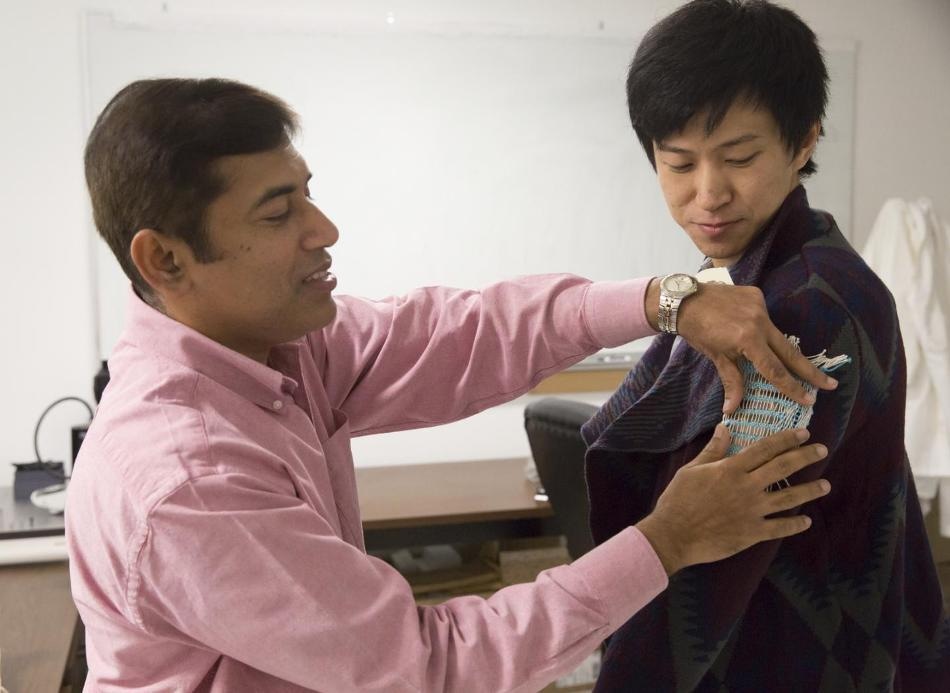Nov 15 2016
 UCF scientist Jayan Thomas has made a breakthrough that would essentially turn jackets and other clothing into wearable, solar-powered batteries that never need to be plugged in. It could one day revolutionize wearable technology, helping everyone from soldiers who now carry heavy loads of batteries to a texting-addicted teen who could charge his smartphone by simply slipping it in a pocket. (Credit: UCF)
UCF scientist Jayan Thomas has made a breakthrough that would essentially turn jackets and other clothing into wearable, solar-powered batteries that never need to be plugged in. It could one day revolutionize wearable technology, helping everyone from soldiers who now carry heavy loads of batteries to a texting-addicted teen who could charge his smartphone by simply slipping it in a pocket. (Credit: UCF)
Inspired by Marty McFly’s self-lacing Nikes in the movie Back to the Future Part II, a UCF scientist has developed filaments that are capable of harvesting and storing solar energy, and can be woven into fabric.
The breakthrough could make jackets and other clothes into wearable, solar-powered batteries that do not need to be plugged in, ever. It can revolutionize wearable technology, assisting everyone from a soldier who now has to carry numerous batteries, to a texting-crazed teen who can recharge his mobile by slipping it into his pocket.
That movie was the motivation. If you can develop self-charging clothes or textiles, you can realize those cinematic fantasies - that’s the cool thing.
Jayan Thomas, Associate Professor, University of Central Florida’s NanoScience Technology Center
The journal Nature Communications published the research on 11th November, 2016.
Thomas has already been much appreciated and awarded for his previous groundbreaking work. In 2015, his invention of a cable that can transmit energy like a regular cable and store it like a battery won him an R&D 100 Award, awarded to the top inventions of the year across the world. The researcher is also developing semi-transparent solar cells that can be used in windows, enabling the harvest of solar energy while allowing light to pass through the glass.
Thomas’ latest work builds on this study.
The idea came to me: We make energy-storage devices and we make solar cells in the labs. Why not combine these two devices together?
Jayan Thomas, Associate Professor, University of Central Florida’s NanoScience Technology Center
The scientist who is currently working at the College of Optics & Photonics and the Department of Materials Science & Engineering, decided to accomplish just that.
Thomas took it a step further and envisioned technology that can allow for wearable tech. filaments in the form of thin, light and flexible copper ribbons were developed by his team. One side of these ribbons contained a solar cell while the other had energy-storing layers.
Despite being more comfortable with handling advanced nanotechnology, the team bought a tiny, tabletop loom. They wove these ribbons into a square of yarn after learning how to use it from another UCF scientist.
The proof-of-concept demonstrates that the filament can be woven into jackets and other outwear to harvest as well as store solar energy to power personal health gadgets, phones and other tech gadgets. This advancement can overcome the major limitation of solar cells – the energy produced must be stored in a battery or flow into a power grid, limiting the portability of the cells.
A major application could be with our military. When you think about our soldiers in Iraq or Afghanistan, they’re walking in the sun. Some of them are carrying more than 30 pounds of batteries on their bodies. It is hard for the military to deliver batteries to these soldiers in this hostile environment. A garment like this can harvest and store energy at the same time if sunlight is available.
Jayan Thomas, Associate Professor, University of Central Florida’s NanoScience Technology Center
There are numerous other potential uses that include electric cars that can generate and store solar energy whenever exposed to sunlight.
“That’s the future. What we’ve done is demonstrate that it can be made,” Thomas said. “It’s going to be very useful for the general public and the military and many other applications.”